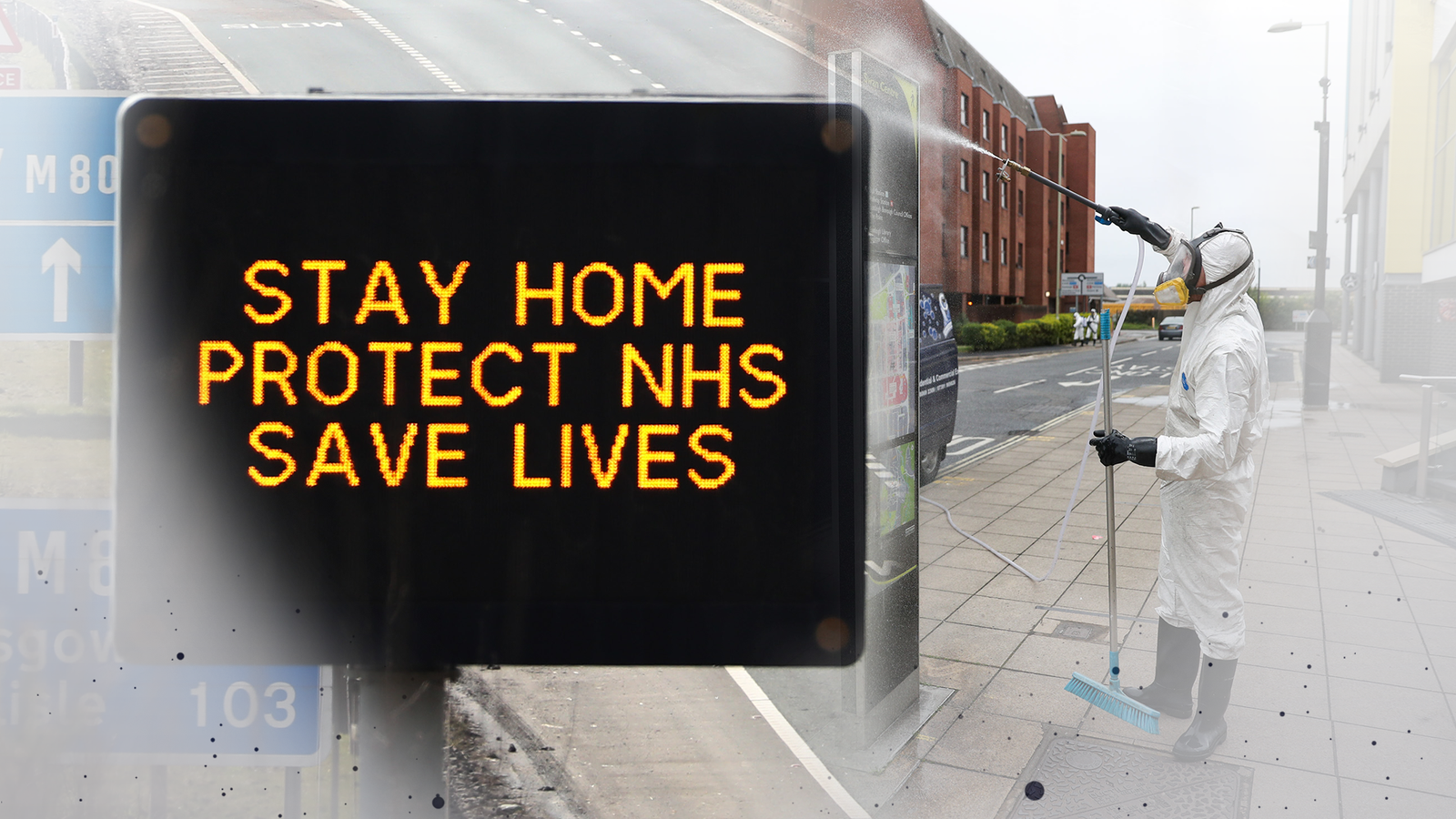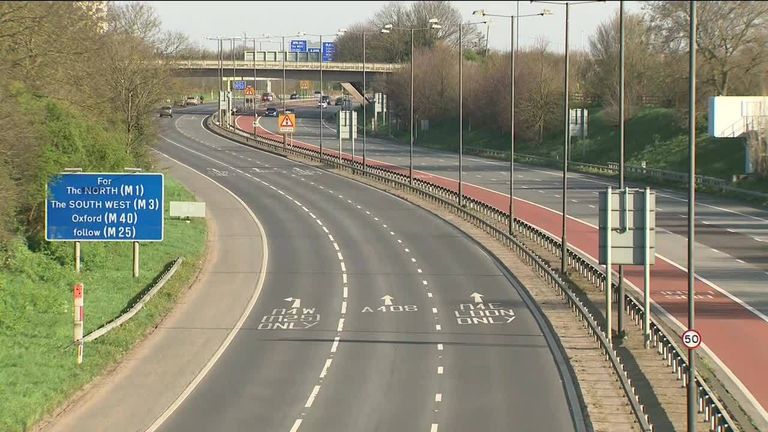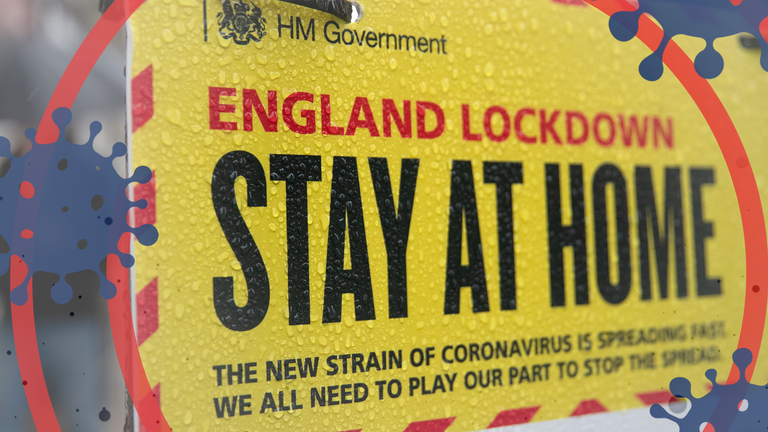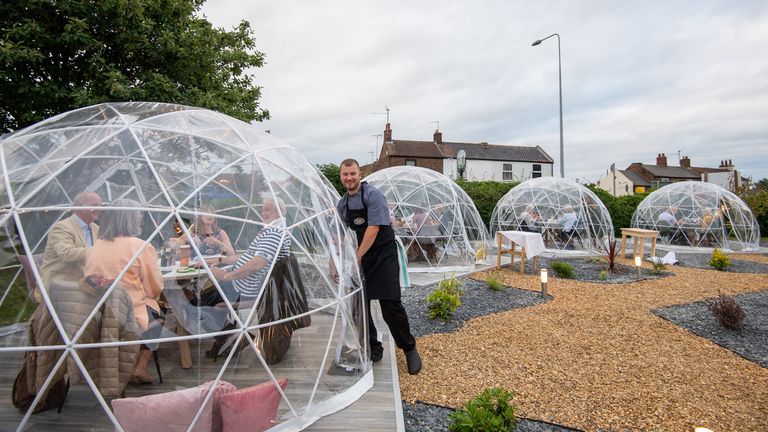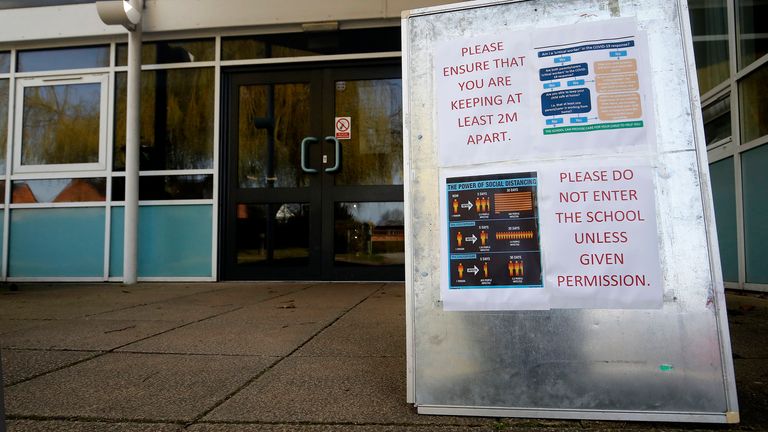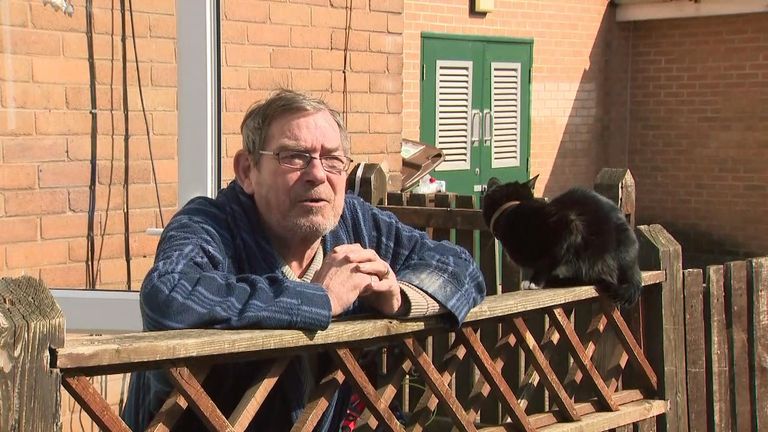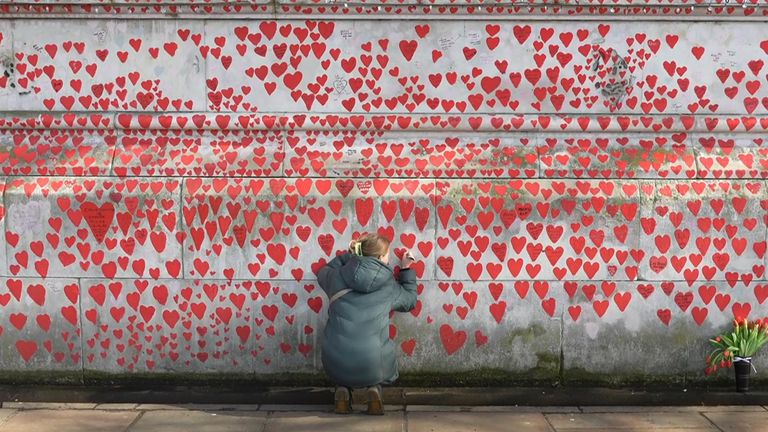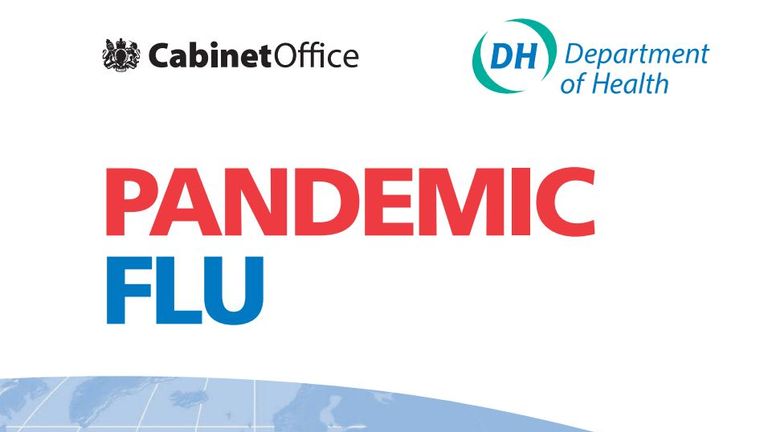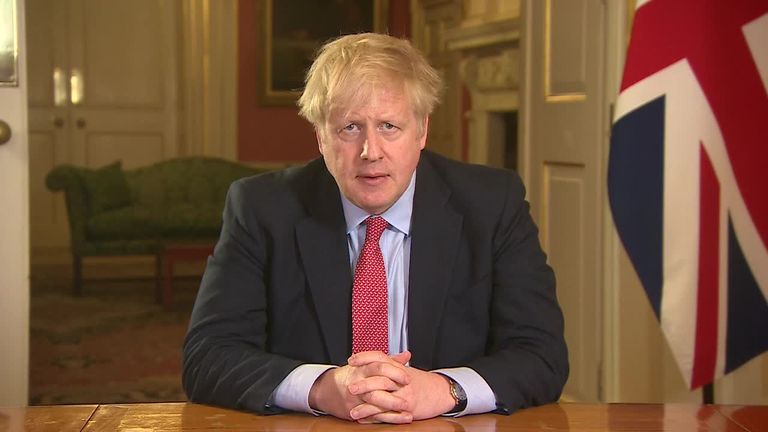
Exactly four years ago today, Boris Johnson announced the UK’s first COVID lockdown, ordering people to “stay at home”.
Working from home became our reality and people were separated from their loved ones, while frontline workers tackled a new and unknown virus.
With a public inquiry under way into how the UK approached COVID-19, many have criticised when and how we went in and out of lockdowns.
So if another pandemic struck, would we have to lock down again – and how would it be different?
Sky News asks scientists and disaster experts whether we would ever be told to stay at home again, what lockdown measures would involve – and whether the public would comply.
When could a pandemic happen again?
COVID has often been referred to as a “once in a lifetime” event. But with more than six million estimated COVID deaths globally, the last comparable pandemic only emerged four decades ago.
HIV/AIDs was first identified in 1981 and has killed 36 million people worldwide. Prior to that, the Hong Kong flu pandemic in 1968 caused about a million deaths, and the Spanish flu of 1918 50 million.
Scientists warn global warming and deforestation are also making it increasingly likely that a viral or bacterial agent will “jump” from animals to humans and cause another pandemic.
“We’re creating a situation that is rife for outbreaks,” says Dr Nathalie MacDermott, clinical lecturer in infectious diseases at King’s College London.
“I know that COVID was very hard for people and we want to believe we can just go back to normal and I understand that entirely.
“But the next pandemic is around the corner – it might be two years, it could be 20 years, it could be longer – but we can’t afford to let our guards down. We need to stay vigilant, prepared and ready to make sacrifices again.”
Dr MacDermott explains that by cutting down trees in the Amazon and parts of Africa, animals and insects are moving closer to people’s homes.
And with rising temperatures, outbreaks of mosquito and tick-borne viruses such as dengue, chikungunya, and Crimean Congo haemorrhagic fever (CCHF) are happening in parts of Europe rarely seen before.
“As temperatures increase around the world, even the UK will become an area where it’s possible for those types of mosquitoes to live,” she says.
How long would lockdowns last?
While there were three lockdowns in England, each several months long, Professor Stephen Griffin, virologist at the University of Leeds, argues there should have “only ever been one”.
“Lockdown was an extreme reaction to a situation that had already got out of control,” he says.
But if there was investment in mitigations like air ventilation in public buildings and generic vaccines and antiviral drugs that could be adapted at speed, he argues, lockdowns would be shorter and less severe.
Dr MacDermott says that until the government, scientists and healthcare workers know more about an emerging virus and how it spreads, “a lockdown would be inevitable to some degree”.
Professor Adam Kucharski, co-director of the Centre for Epidemic Preparedness and Response at the London School of Hygiene and Tropical Medicine, says that if you can’t contain severe infections and eliminate them completely – like Ebola in Africa and SARS-1 in East Asia – the only way to prevent a large disease epidemic is by heavily reducing transmission until a vaccine or treatment make the population less susceptible.
In the UK, it was eight months before the first COVID vaccine was administered and more than a year before it was rolled out more widely.
Would we be banned from socialising – and would schools shut?
Professor Lucy Easthope, expert in mass fatalities and pandemics at the University of Bath, says she would want to see what she calls a “nuanced quarantine”.
“Lockdown is never a word I would have used – it’s only really associated with things like school shootings,” she says.
With regards to restrictions on socialising, she stresses how important “community and connection” are for disaster planning.
The 2016 UK flu plan says public gatherings are “an important indicator of normality” and that “there is little direct evidence of the benefits of cancelling such events”.
Authorities should immediately prioritise creating “large ventilated safe spaces” for children, pregnant women, and vulnerable people, she says.
This would involve places like cinemas, leisure centres, and town halls being repurposed as community centres.
She adds the importance of people having a “purpose”, so being able to meet people socially outside should be allowed as soon as the nature of the virus is clear.
Similarly, pubs, bars, cafes, and restaurants should be allowed to open outdoors as soon as possible, she says.
While the flu plan does advise schools in infected areas to shut, contingency measures have been suggested for temporary marquees to host lessons – or just spaces for children to go.
“Lots of children don’t have gardens, so organised ways of getting them outside is important,” Professor Easthope says.
“For the marquees for education, you might expect to see three or four schools consolidated together.”
Another ‘pingdemic’?
The government spent billions on its test and trace system, which included testing centres, the coronavirus helpline, manual contact tracing by what was then Public Health England, and the NHS COVID app.
While rapid tests are important to stop people from spreading the virus further, and the app “had a lot of promise”, more innovative digital contact tracing may be required to avoid relying on another lockdown, Professor Kucharski says.
“The pingdemic was to some extent the NHS app doing what it was designed to do,” he says.
“But with the digital contact tracing infrastructure that some Asian countries had, you can limit disruption to those people at higher risk in a particular outbreak rather than reverting to blanket measures.”
He cautions that it would require “hard conversations” around privacy, but options include using smartphone location and debit card transactions to link people to identified cases.
In some countries, leaving quarantine would see people’s phones automatically notify tracers of potential further spread.
Would the public comply?
When public health experts gave evidence to the COVID inquiry last year, they said they were wrong to assume the public would soon tire of a lockdown and suffer “behavioural fatigue”.
Social psychologist and crowd behaviour expert Chris Cocking says it was a lack of trust in government that caused compliance rates to fall – not simply getting “tired” of restrictions.
“The overall message should be positive,” the principal lecturer at the University of Brighton says. “Because if another situation arose, where it became necessary, people would be likely to comply.”
He says if another lockdown was needed, the current Tory government would either have to minimise scandals over their own rule-breaking – or change hands completely to keep the public on board.
He adds: “If we had a new government, people would be far more likely to have faith in them because they would be less likely to say, ‘it’s the same bunch as before – why should we do it again?’
“And if they put more effort into not having situations like ‘Partygate’ or Dominic Cummings driving to Barnard Castle, they could appeal to the public’s shared sense of identity, and it would be possible for compliance rates to remain relatively high.”
From COVID fines to arrests made during Black Lives Matter protests and the Sarah Everard vigil, Professor Easthope describes lockdown legislation as “definitely bad” and “cruelly applied”.
Dr Cocking argues lockdown laws are largely irrelevant to people’s decision to adhere to restrictions or not.
“It’s not the laws in place, it’s whether people psychologically identify with the need to comply,” he says.
And for people who don’t, engaging with each reason individually is important to avoid creating a mass movement of “lockdown sceptics”.
“People might feel unable to comply with restrictions for lots of different reasons. But it’s a real mistake to lump them all together because you then identify them all as part of the same group, which further alienates them from the authorities,” Dr Cocking adds.
Would we be well enough prepared?
Four years before COVID, the UK had carried out secret pandemic preparedness exercises for both flu and coronavirus outbreaks.
A detailed report on the flu exercise was compiled, but public health officials have told the COVID inquiry that the coronavirus drill wasn’t acted on.
According to Professors Kucharski and Easthope, the more extensive flu plan could be easily adapted.
“The separation of a flu plan from a coronavirus plan is nonsense,” Professor Kucharski says.
“The characteristics of COVID were a lot like the sort of infection in a flu pandemic. It should have been a wider discussion about what the acceptable outcome was from the horrendous trade-offs we were going to have to make.”
Read more:
Doctors suing NHS over long COVID
How widespread is COVID now?
Professor Easthope says in the late 2010s, she and other emergency planners identified holes in infrastructure that meant the UK “wasn’t ready for even a relatively manageable pandemic” in terms of health and social care. She also says stockpiles of PPE “failed” in 2017.
But she says the internet’s capacity to cope with so many processes moving online is both “enabling and unifying”.
“We just didn’t know how well it would perform, but in the end, it was one of the reasons we didn’t fall apart completely,” she says.
A Department of Health and Social Care spokesperson told Sky News: “Throughout the pandemic, the government acted to save lives and livelihoods, prevent the NHS being overwhelmed and deliver a world-leading vaccine rollout which protected millions of lives across the nation.
“We have always said there are lessons to be learnt from the pandemic and we are committed to learning from the COVID-19 inquiry’s findings which will play a key role in informing the government’s planning and preparations for the future. We will consider all recommendations made to the department in full.”

